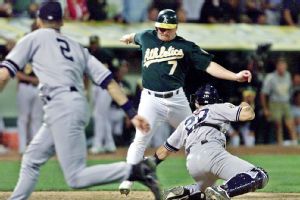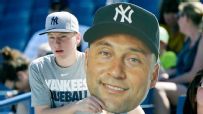As the captain turns 40, Billy Beane knows the SS is more valuable than stats show
By Ian O'Connor
June 25, 2014

Photo: AP
Around the time Derek Jeter passed his 35th birthday and made the hard turn towards 40, Billy Beane saw him as a cross between Benjamin Button and Peter Pan. You can understand why the general manager of the Oakland A's would come to view Jeter as a man who refused to grow old and as a ballplayer who would never surrender to his own mortality.
Long criticized by sabermetricians for flunking their exams on defense, Jeter, the glamorous shortstop of the gluttonous New York Yankees, was the ironic conqueror of the Moneyball A's at their very best. The flip play in Game 3 of the 2001 American League Division Series and the catch and crash landing in the photographer's pit in Game 5 enhanced the Jeter legend while helping topple a 102-win Oakland team that was plenty good enough to win it all.
[+] Enlarge

AP Photo/Eric RisbergThe famous flip play from Game 3 of the 2001 ALDS enhanced Derek Jeter's legend.
"I still hate to see him go," Beane said by phone Wednesday, "even though he was party to some of my greatest heartbreak as a GM."
Jeter isn't gone just yet. But he does celebrate his 40th birthday Thursday, and with three regular-season months left in his career, the time was right to ask one of the driving forces behind the metric movement if the Yankees captain did indeed rise high above his limitations at short, or if his greatness was overstated in a market known to get a little carried away.
Beane pointed out that his career as an executive almost ran parallel to Jeter's as a player. He was Oakland's assistant GM in the mid-'90s and was promoted to the big job in October of '97 after Jeter's Yankees were knocked out of the playoffs by the Cleveland Indians and denied a repeat in his second full year. And in some ways, Beane became as much of a star as the shortstop did, inspiring Michael Lewis' runaway bestseller, "Moneyball," and an Academy Award-nominated film of the same name.
Of all the honors Jeter has collected over the years, he's never had Brad Pitt play him in a movie.
Only the shortstop has five championship rings, or five more than Beane has won in Oakland. In fact, as remarkable as the A's have been on payrolls that wouldn't ordinarily cover three-quarters of a Yankees infield, they've prevailed in only one out of eight playoff series under Beane.
He doesn't need to be reminded, either, now that Oakland has baseball's best record and the inside track on another postseason berth. But lately, Jeter has been on his mind some; he's been on everyone's mind in the game. "I was just telling one of my younger players that Derek reminds me of my teammate in Minnesota, Kirby Puckett," Beane said. "Do you know what it's like when your best player, a Hall of Famer, is also the most respected and best-liked guy in the clubhouse? It creates a unique dynamic for a team. From an outsider's perspective, Derek has been that guy. In 20 years, I've never heard a bad word about him."
Actually, he's heard a few from fellow sabermetricians who have documented Jeter's middling range and the runs he's said to have cost his team. In the Fielding Bible, Bill James once wrote the following: "In one way of looking at it, it makes intuitive sense that Derek Jeter could be the worst defensive shortstop of all time." James would concede that Jeter more than compensated for his weaknesses and that he was "a tremendous player" whom James would absolutely want on his team.
As for a Baseball-Reference.com metric that had Jeter giving up more runs than any position player in history, Beane said, "It's like saying a GM had the most bad trades in history; that GM had the job long enough to make those mistakes for a reason. I joke with [Yankees GM Brian Cashman] about that. Brian's been very good at what he does, but when you last that long, people only list all of your bad moves. For Jeter, it only means he's been playing at the top of his position longer than anyone in history."
That run has seemed longer to Beane than most. He once said, "I've spent my whole front-office career waiting for Jeter to slow down."
For good reason. A year after the 2000 Yankees knocked them out in an ALDS Game 5, the A's had everything going for them. They had three young pitchers in Barry Zito, Tim Hudson, and Mark Mulder who had combined for 56 victories and three infielders in reigning MVPJason Giambi, Miguel Tejada, and Eric Chavez who had combined for 101 homers and 347 RBI. They had a 2-0 lead in the best-of-five ALDS (they won those two games in the Bronx, no less), and they held a 1-0 lead in the seventh inning of Game 3. More than anything, they held an opportunity to bury the team that had won four World Series titles in five years.
And then, the flip happened. Shane Spencer overthrew two cutoff men from right field, Jeter raced toward the first-base line to retrieve the errant ball and made an option pitch on the run to Jorge Posada, who applied the tag to Giambi's brother, Jeremy, who was so sure he'd be safe that he didn't bother to slide.
"I still watch it now," Beane said of the replays. "And every time I watch it, I think the result is going to change, if that makes sense. I see the angle Jeter had, and I see how close Giambi is to the plate, and it's just hard to believe Jeter is going to make that play. I still think Giambi's going to be safe."
Back in the Bronx for Game 5, Beane couldn't bear to watch. He left the Stadium with his team holding an early 2-0 lead, hopped on a train to Manhattan and hoped his absence would somehow alter the momentum of the series and make the pinstriped bogeymen go away. Beane returned to his seat in the late innings and watched the inevitable unfold. Jeter batted .444 for that ALDS but got so banged up on his fall into the photographer's pit that he wasn't the same player in the victory over the Seattle Mariners in the next round or in the epic World Series loss to the Arizona Diamondbacks.
All these years later, Jeter's body has finally had enough. As the captain prepared to turn 40, prepared to head for home, Beane was asked if Jeter had done enough in his career to make all those unforgiving metric assessments of his defense moot. "It's a hard question for me to answer from my distance, and at some point, the numbers always mean something," Beane said. "I'm as ruthlessly quantitative as anybody. But in the media capital of the world, playing for the most storied franchise, Jeter has always taken so much pressure off the other 24 guys, and you can't measure how valuable that is.
"You have to take the player in total, not just one part of him. Jeter is a first-ballot Hall of Famer who did so many other things so much better than everyone else. I doubt I'll ever see a professional athlete in my lifetime who handles himself as perfectly as he has."
Beane caught his final glimpse of Jeter in Oakland a couple of weeks ago, and he knows what everyone else in baseball knows: The shortstop isn't what he used to be, nor is his team.
But that doesn't mean it's time to rule out the possibility of a 40-year-old captain helping -- if not leading -- the Yankees back to the postseason.
"A guy like that?" Beane said. "No question he can do that. He still has that swing, that ability to hit the ball to right field and hit it hard.
"And when all is said and done, hey, he's still Derek Jeter."


No comments:
Post a Comment